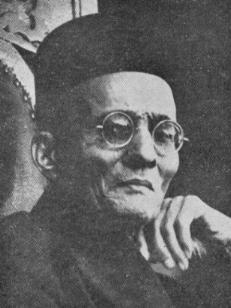Vikram Sampath - Savarkar, Echoes from a Forgotten Past
Vinayak Damodar Savarkar: Zitate auf Englisch
“The epitaph of an RSS man will be: he was born, went to shakha, and died.”
Quoted from Elst, Koenraad (2014). Decolonizing the Hindu mind: Ideological development of Hindu revivalism. New Delhi: Rupa. p. 256
(Oh Shivaji! This land of the Aryans
has been repeatedly attacked by the Mlechchhas non-Indians).
English translation. From a poem by V. D. Savarkar, quoted in Vikram Sampath - Savarkar, Echoes from a Forgotten Past, 1883–1924 (2019)
V.D. Savarkar: Hindu Rashtra Darshan. p. 77.
Hindutva, p. 90.
V.D. Savarkar quoted from B.R. Ambedkar, Pakistan or The Partition of India (1946)
V.D. Savarkar quoted from B.R. Ambedkar, Pakistan or The Partition of India (1946)
Vikram Sampath - Savarkar, Echoes from a Forgotten Past
Vikram Sampath - Savarkar, Echoes from a Forgotten Past
Vikram Sampath - Savarkar, Echoes from a Forgotten Past
Vikram Sampath - Savarkar, Echoes from a Forgotten Past
Vikram Sampath - Savarkar, Echoes from a Forgotten Past
Janaki Bakhle quoted in Vikram Sampath - Savarkar, Echoes from a Forgotten Past, 1883–1924 (2019)
Ambedkar, Pakistan or the Partition of India http://www.columbia.edu/itc/mealac/pritchett/00ambedkar/ambedkar_partition/307a.html#part_2
Hindutva
From a speech by V. D. Savarkar, quoted in Vikram Sampath - Savarkar, Echoes from a Forgotten Past, 1883–1924 (2019)
V. D. Savarkar, quoted in Vikram Sampath - Savarkar, Echoes from a Forgotten Past, 1883–1924 (2019)
V. D. Savarkar, quoted in Vikram Sampath - Savarkar, Echoes from a Forgotten Past, 1883–1924 (2019)
V. D. Savarkar, quoted in Vikram Sampath - Savarkar, Echoes from a Forgotten Past, 1883–1924 (2019)
V.D. Savarkar: Hindu Rashtra Darshan, quoted in part in Elst, Koenraad (2001). Decolonizing the Hindu mind: Ideological development of Hindu revivalism. New Delhi: Rupa. p.332
V.D. Savarkar: Six glorious Epochs, p.136. (-: Six Glorious Epochs of Indian History. Veer Savarkar Prakashan, Bombay 1985 (1963).)
1923. Quoted from Elst, Koenraad (1992). Negationism in India: Concealing the record of Islam.
English translation. From the poem ‘Shivaji’s Utterances’ (and signed ‘mark of the Bhawani Sword’) which appeared in the editorial columns of the Kesari . V. D. Savarkar, quoted in Vikram Sampath - Savarkar, Echoes from a Forgotten Past, 1883–1924 (2019)
